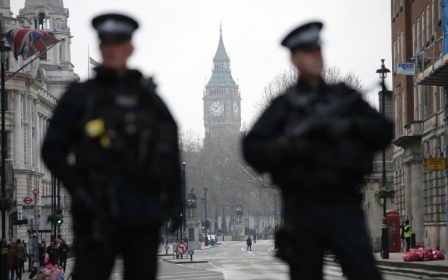Senior Prevent official accused of 'doxxing' over deleted tweet
A senior Prevent official has been accused of “doxxing” after misidentifying the author of an anonymous Twitter account critical of the UK government's counter-terrorism strategy.
Doxxing is the practice of publishing private information about a person on the internet.
In a post on the social media site on Wednesday, William Baldet, the regional Prevent coordinator for the Midlands, published an image of a man he named as Sabure Malik, who he said had trolled him using the Twitter handle @GleamingRazor.
But Baldet deleted the tweet after another Twitter user identified himself as Malik and said he was instructing lawyers about his naming and the use of his photo wrongly linking him to the @GleamingRazor account.
In a subsequent tweet, Baldet wrote: “Malik has contacted me via DM and given his assurance that he is unconnected to this account which he claims is an extremist account.”
Speaking to Middle East Eye, Malik said he had been “pinged by somebody out of the blue” to alert him to the use of his name and photo in the tweet.
“I couldn’t believe my eyes,” he said. “This is an extremist account by the government's definition, however controversial the phrase extremism is. He has put a private citizen's picture and name onto his feed and he has not even had the courtesy to apologise.”
Malik, who works in financial law, said he planned to complain to the Home Office and was also considering making a separate complaint to the Information Commissioner’s Office, the UK’s data watchdog.
“Is this really the behaviour of a senior counter-terrorism official sticking someone’s name and face up knowing full well in the current climate what the consequences could be? I think they call it doxxing,” he said.
“This is not something that has no consequences, it is very concerning. Put it this way, if you went for a job interview and your name is coming up linked to an account where extremely controversial views are aired you are not going to get the job.”
Baldet is a prominent advocate of Prevent who has frequently defended the contentious strategy in the media and on social media. Last month he was awarded an MBE in the Queen’s honours list in recognition of his work as a Prevent coordinator.
MEE contacted Baldet and the Home Office to ask whether his use of Twitter was part of his formal role as a Prevent coordinator but a Home Office spokesperson declined to comment.
What is the Prevent Strategy?
+ Show - HidePrevent is a programme within the British government's counter-terrorism strategy that aims to “safeguard and support those vulnerable to radicalisation, to stop them from becoming terrorists or supporting terrorism”.
It was publicly launched in the aftermath of the 2005 London bombings and was initially targeted squarely at Muslim communities, prompting continuing complaints of discrimination and concerns that the programme was being used to collect intelligence.
In 2011, Prevent's remit was expanded to cover all forms of extremism, defined by the government as “vocal or active opposition to fundamental British values, including democracy, the rule of law, individual liberty and mutual respect and tolerance of different faiths and beliefs.”
In 2015, the government introduced the Prevent Duty which requires public sector workers including doctors, teachers and even nursery staff to have “due regard to the need to prevent people being drawn into terrorism”.
A key element of Prevent is Channel, a programme that offers mentoring and support to people assessed to be at risk of becoming terrorists. Prevent referrals of some young children have proved contentious. 114 children under the age of 15 received Channel support in 2017/18.
Criticism of the Prevent Duty includes that it has had a “chilling effect” on free speech in classrooms and universities, and that it has turned public sector workers into informers who are expected to monitor pupils and patients for “signs of radicalisation”. Some critics have said that it may even be counter-productive.
Advocates argue that it is a form of safeguarding that has been effective in identifying and helping troubled individuals. They point to a growing number of far-right referrals as evidence that it is not discriminatory against Muslims.
In January 2019 the government bowed to pressure and announced that it would commission an independent review of Prevent. This was supposed to be completed by August 2020. After being forced to drop its first appointed reviewer, Lord Carlile, over his past advocacy for Prevent, it conceded that the review would be delayed.
In January 2021 it named William Shawcross as reviewer. Shawcross's appointment was also contentious and prompted many organisations to boycott the review. Further delays followed. Shawcross's review, calling for a renewed focus within Prevent on "the Islamist threat", was finally published in February 2023 - and immediately denounced by critics.
The identity of the user behind the @GleamingRazor handle is unknown. The user also blogs about political and Islamic issues under the name Da Masked Avenger and is regularly scathing about Prevent and British counter-extremism policies.
In a Twitter thread in July, @GleamingRazor compared the Prevent strategy to the persecution of Uighurs in China.
Baldet’s deleted tweet, which he signed off with two heart emojis and the hashtag #bromance, was prompted by @GleamingRazor commenting “LOL” on a previous tweet in which Baldet had shared an opinion article calling on Muslims in Western countries to stand with French President Emmanuel Macron.
Contacted by MEE via Twitter, @GleamingRazor said that the episode “demonstrates quite aptly why my account remains anonymous”.
“Mr Baldet’s behaviour can only be described as intimidating and raises serious questions as to how he operates in a professional capacity. One has to ask what safeguards are in place to prevent abuse of power? Could he for example obtain my personal details via intelligence sources and then leak them?”
Commenting on the characterisation of the output of his social media and blogging accounts as “extremist”, he said “naturally it’s an ascription I reject”.
The image of Malik posted by Baldet appeared to be taken from a news report in 2014 about a meeting between former Liberal Democrat leader Paddy Ashdown and Muslims calling on the party to take action against Maajid Nawaz, a then-parliamentary candidate for the party who had shared cartoons of the Prophet Muhammad on social media.
Malik said it was the only political event he had attended in about 20 years. His only previous involvement in activism had been as a student, he said. The image had prevously been published on a number of anonymous Twitter accounts, some now deleted, without Malik's knowledge.
“They interviewed two guys and I was standing in the background. On the back of that people must have thought I was some kind of Godfather, even though I didn’t utter a word," he said.
"I’m just a bloke who happened to meet Paddy Ashdown on the wrong day."
Middle East Eye propose une couverture et une analyse indépendantes et incomparables du Moyen-Orient, de l’Afrique du Nord et d’autres régions du monde. Pour en savoir plus sur la reprise de ce contenu et les frais qui s’appliquent, veuillez remplir ce formulaire [en anglais]. Pour en savoir plus sur MEE, cliquez ici [en anglais].




